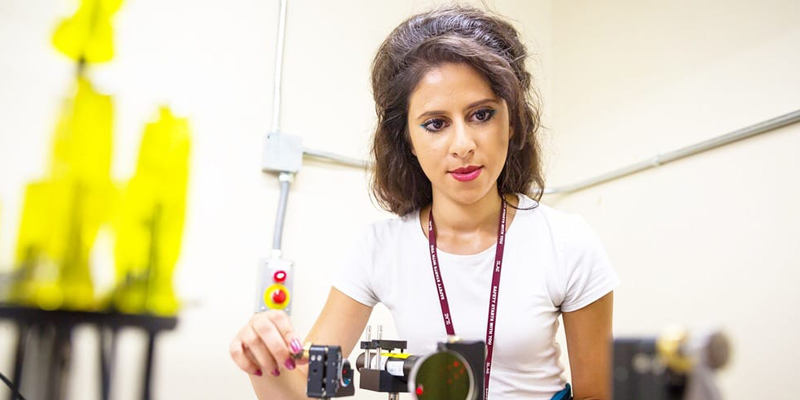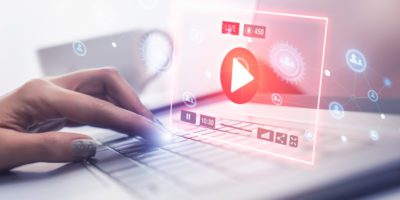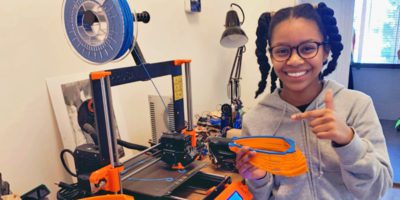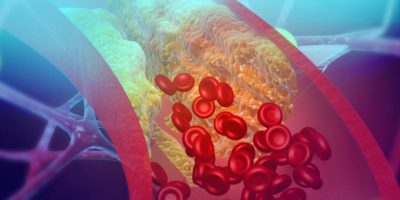Meriame Berboucha is currently studying for her PhD from Imperial College London whilst conducting research at the SLAC National Accelerator Laboratory at Stanford University in California. She holds an undergraduate degree in physics and a masters in photonics from Imperial College, London, where she developed her passion for lasers and plasma physics.
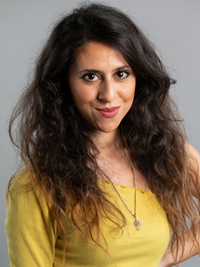
“…never ever let anyone tell you that you can’t do something. I don’t want that negative message of ‘women can’t do physics’ to be sent to today’s school students. I want to change it. I want people to feel like they can see somebody like them in that field and find inspiration there to continue to do what they love…”
Starting my PhD in a pandemic
When I last spoke with Womanthology I was doing my masters at Imperial College in photonics. I have since moved to the US and I’ve started my PhD, actually still with Imperial College in London, but I’m based at the SLAC National Accelerator Laboratory in California.
I literally started my PhD only three months ago. It’s so weird starting a PhD in the pandemic, but here we are trying to get through it. Also, all my courses are in England, and there’s an eight-hour time difference, which was something else to get used to!
Baby accelerators x-raying warm, dense matter
I work with high-power lasers. Here at SLAC we’ve got the longest linear particle accelerator in the world. And at the end of that particle accelerator, you’re basically producing an X ray laser, and with that you can take loads of cool images.
In a similar way to this big x-ray laser I also take snapshots of materials with x-rays produced with a much smaller (baby) plasma accelerator. When you shoot a high power laser into a hot gas you can accelerate electrons. Instead of accelerating charged particles over metres and metres of accelerating structures with a plasma accelerator you can do this over a few millimetres or centimetres! We use these ‘baby’ accelerators to produce x rays, and I use those x rays to take images of stuff.
The stuff that I’m looking at is material in a state of matter known as warm dense matter that is found in planets like Neptune, Uranus and even our own planet. Warm dense matter is in between a cold solid and a plasma (ionised gas). With these plasma accelerators, I can take snapshots of this warm dense iron as it goes through this warm dense matter state, helping us understand the dynamics of the interiors of these planets! Who knew you could do so much with lasers!
Impact of COVID-19
I also did a hybrid type of degree for my masters, so I was out here back in 2018 to the present doing experiments. I’m really lucky to have done that, because I have data now that I’m analysing for my PhD. If I started my PhD in England now, I honestly think I wouldn’t have data to analyse from an experiment I was on because I wouldn’t have been able to go on any experiments because of the pandemic.
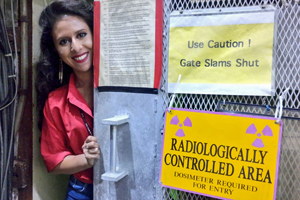
Currently I have no scheduled time back at the lab so I’m just at home working now. But at least I have some data to work with. I’ve got some talks for conferences back home, but I’m not able to fly over to deliver them in the UK time zone and see my family. I have no idea when I’ll be back home and since moving to the US this has been the longest I’ve been away from home so that’s also been tough. But I am super grateful to be still taking part in experiments to have been able to go back to the lab for a little while to do experiments.
Using social media to share similar struggles
I think I love social more during the pandemic, because I feel like there’s so many more people to relate to. Scientists have all gone through very similar struggles of how we continue research at home. Or how do we continue to study at home in this environment where maybe you’re living with other people, or you might be with your parents, or other home environments.
And I think we’re able to have a stronger community now because even though we’re not seeing people in person, social media allows us to be able to share struggles that we’re all facing as we all battle through this pandemic. For me in my research group at SLAC, I’m the only student. However, in England, I’ve got other PhD students, so it’s been nice connecting with them online because I don’t get to see or hear from other PhD students in my daily life here in the US, which can be tough and that’s why I love social media too because I’ve got a great community of other PhD students to share experiences with and I’m super grateful for that.
It’s been so nice just sharing what it’s like to work in a lab during a pandemic, too. And the new rules that we’ve had to learn – how to work with masks for more than eight hours. The shifts for my experiment were 12 hours long, which was hard to adjust to at first with the masks.
Loads of people are starting their own social media pages or podcasts and sharing their stories now because they feel like they have more time and/or to feel that connection with other people around the world who are also doing the same thing as them. There are loads of people out there who are doing Twitch streams of study sessions too. It’s just nice to be part of that community and not feel on my own. I think it’s the same for a lot of people.
Being a woman of colour in science
When I was in the UK, it honestly didn’t feel being a woman of colour in science was too much of a problem. I was in my research group, and I was welcomed with open arms and there were other women there too so it felt nice to go from a school student where I was the only girl in my classroom to a research student where there were others women in the field. Everyone was super friendly, super nice and I didn’t feel any biases. I will say though, that going through university without seeing a woman of colour teaching any of my courses did make me have doubts about what I was doing.
As a brit in the US the first thing I noticed was how much my accent was commented on. At times I did feel like a zoo animal where people would just ask me to say words like ‘water’ over and over again for their entertainment.
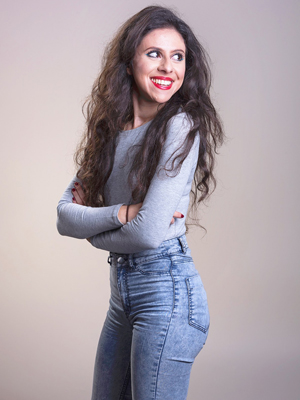
That really annoyed me when I first moved to the US because I felt that just because I’m wearing a nice dress does not mean that I’m any less of a scientist. For me, how I dressed really made a difference to how I was treated in conference room whilst in research group meetings.
Even to this day walking out on the street, I feel like people are staring and it’s so weird because in London everyone’s doing whatever they want. I miss being in a city where I could go out and wear whatever I wanted and it wouldn’t be seen as weird or different. There were so many people in London who had cool style too. I didn’t realise how much of a difference it would make in my day-to-day life being in California with a passion for fashion.
A forum to share the story of my life
In terms of being a woman of colour, I was part of a SLAC symposium for diversity, and equity, and inclusion, and it was nice seeing how many people at the lab were supportive. I gave a talk about my journey as a woman of colour or how I describe it a minority in a minority or minority squared. And being able to do that helped me feel more comfortable at SLAC and I could find a community of people who also wanted to help the lab be more inclusive. On the flip side, it was also interesting to see how many people didn’t realise that there were still problems and room for improvement.
I loved being able to share my story of going through academia, as someone who has North African parents, and having a kind of dual life being brought up in an Algerian way in London. And then after that moving to the US and learning how to live in a different culture although not too dissimilar to the UK culture but enough of a difference that I had to get used to it. It was nice to have that support from the lab and I think it’s important to do things like that to bring awareness to stories that might not be heard.
Yearning to see people like me
In academia in general I don’t really see people that look like me, so I really want to change that. Whenever there’s a programme where we get young students coming into the lab I’m always introducing myself to them because I want them to be able to see people who look like them as well as a diversity of people that they meet in a STEM setting.
I do think that starting with the education system and making a difference there will hopefully lead to a chain reaction of things that will help with the numbers in academic research. For that reason, I’ve always made sure that I’m doing talks with schools.
When I was at school, I did not see women teaching physics. I was the first girl at my school to take physics on to higher education. So, I made sure that I went back to my school and I did a science club for two years of my undergrad because I was so adamant that I wanted to get rid of this idea that there’s no women doing physics. If you love the subject, you should be able to do it.
There were teachers at my school who said: “This is a guy subject and you shouldn’t do it.” I remember my own head teacher telling me that I wouldn’t be able to go to university and here I am now starting a PhD!
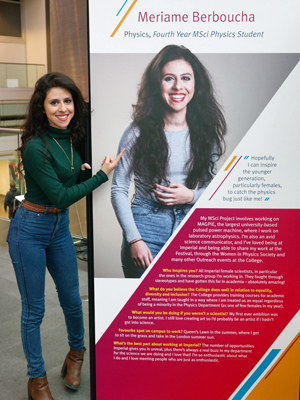
Differences between aspiration in the UK and US
This interview, for example, is perfect for sharing stories of other people doing great things in STEM. The UK does this so well. However, I’ve noticed the difference between the US and the UK in this sense, where there are so many programmes that you can take part in in the UK and I’ve struggled a bit to find them in the US (so if anyone knows of any, hit me up!).
In the UK you can be a STEM ambassador, or maybe take part in programmes at your university. There’s so many chances to, for instance, work with students and, and even just being able to have a student shadow you can completely change their lives.
When I was a kid I went and did a medical physics internship in a hospital, and it completely changed my life. And I said: “Okay, I want to do this now.” There are so many experiences like this that can totally change a students’ perspective on a career path and really give them that boost they needed to pursue their dreams.
It could be just five minutes of your day where you’re talking to a student, or you share something really cool that you’re doing because you love what you do and that passion is contagious. Even just a selfie can be so powerful – you associate a face to a subject and if that person looks like them it can change the ‘norm’ of what we define as a scientist in society.
We can all do little things to help spread the message that this subject is for everyone. Science is global, and we should all be able to do what we want to do if we’re passionate about it no matter what society tells us.
It’s time to push boundaries
I first moved to SLAC because I attended a talk by one of the directors of the lab and funnily enough I was too scared to ask him a question but he was on Twitter and I tweeted him… It then led to a conversation about how much I wanted to work at SLAC and then about a year of paperwork later I became the first international (non-US citizen) intern to participate in their internship programme. I just couldn’t accept no for an answer. And since then there’s been other international students from all over the world being able to take part in that programme and it’s so lovely to see. I cried.
If you see a gap (and maybe you are somebody that really wants to make a change and do something) why not ask and push the boundary a little bit, and see if you can, change something too? I’m always searching for ways that we can improve and help with this.
As individuals, there are loads of little things that we can do to make a difference and it could just even be a selfie or showing a student what your lab looks like and chatting to them for a bit. It’s these little things that certainly helped me choose STEM and more importantly now stay in STEM. Seeing other women in STEM killing it in their careers certainly helps me through the rough patches and we’re all in this together and we can support each other through our STEM journeys.
You also never know what someone’s background is like too, they might not have the support they need at home and you being a friendly inspirational face to them could totally change their lives. Growing up my parents were quite hesitant about me doing physics. They wanted me to become a medical doctor but I was unsure of this and was actually super interested in physics. So I did my research into where physics could lead me. I actually even made a little poster on this which I took into school career events I get invited to and it was the same poster I gave to my parents to show them the myriad of jobs physics would make me available for.
There’s loads of people who have different levels of support so if you can be their inspiration, you never know, you could really change someone’s life.
We can all get through this together
I started my PhD back in October and our hard deadline for PhDs in the UK is about four years. I’ll be in the US up until 2023 when my VISA expires, and then I’m off to England for a year, where I’ll be essentially writing up my thesis. So, I’ve got just under three more years here and then I’m back home. It’s quite a weird feeling knowing that the majority of my PhD will be during a pandemic, but we’re all in this together trying to survive and thrive.
If anybody has any questions about careers in science or if they are working on their PhD, or whatever it is, I am totally happy to answer any questions. More than ever, I think we should all support each other. We can all get through this together.
https://www.linkedin.com/in/meriame-berboucha-a7699492/
https://www.instagram.com/girl_in_a_physics_world/
http://www.twitter.com/girl_in_physics

